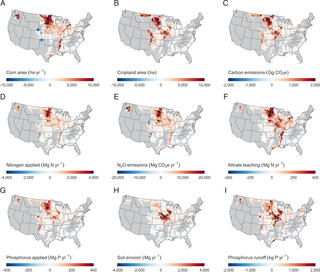Environmental outcomes of the US Renewable Fuel Standard
Lark et al. "Environmental outcomes of the US Renewable Fuel Standard" PNAS 119 (2022) [DOI: 10.1073/pnas.2101084119]
Biofuels are included in many proposed strategies to reduce anthropogenic greenhouse gas emissions and limit the magnitude of global warming. The US Renewable Fuel Standard is the world’s largest existing biofuel program, yet despite its prominence, there has been limited empirical assessment of the program’s environmental outcomes. Even without considering likely international land use effects, we find that the production of corn-based ethanol in the United States has failed to meet the policy’s own greenhouse gas emissions targets and negatively affected water quality, the area of land used for conservation, and other ecosystem processes. Our findings suggest that profound advances in technology and policy are still needed to achieve the intended environmental benefits of biofuel production and use.
